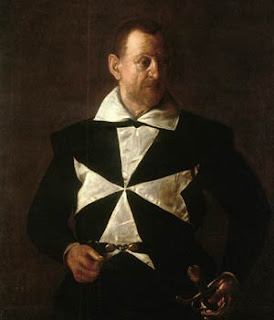 |
| Knight of St John of Malta by Caravaggio |
The Nativity of John the Baptist is a Christian feast day celebrating the birth of John the Baptist, a prophet who foretold the coming of the Messiah in the person of Jesus, whom he later baptised.
Christians have long interpreted the life of John the Baptist as a preparation for the coming of Jesus Christ, and the circumstances of his birth, as recorded in the New Testament, are miraculous.
John's pivotal place in the gospel is seen in the emphasis Luke gives to the announcement of his birth and the event itself, both set in prominent parallel to the same occurrences in the life of Jesus. The Nativity of John the Baptist on June 24 comes three months after the celebration on March 25 of the Annunciation, when the angel Gabriel told Mary that her cousin Elizabeth was in her sixth month of pregnancy, and six months before the Christmas celebration of the birth of Jesus.
The purpose of these festivals is not to celebrate the exact dates of these events, but simply to commemorate them in an interlinking way. The Nativity of John the Baptist anticipates the feast of Christmas.
More information: Loyola Press
The Nativity of John the Baptist is one of the oldest festivals of the Christian church, being listed by the Council of Agde in 506 as one of that region's principal festivals, where it was a day of rest and, like Christmas, was celebrated with three Masses: a vigil, at dawn, and at midday.
It is one of the patronal feasts of the Order of Malta. All over Europe Saint John's fires are lighted on mountains and hilltops on the eve of his feast. As the first day of summer, Saint John's Day is considered in ancient folklore one of the great charmed festivals of the year. Hidden treasures are said to lie open in lonely places, waiting for the lucky finder.
 |
| Bonfires on Saint John's Eve |
Divining rods should be cut on this day. Herbs are given unusual powers of healing, which they retain if they are plucked during the night of the feast.
Festivals of Midsummer's Eve or St. John's Eve among Christians have roots in ancient celebrations related to the summer solstice. Bonfires were lit to protect against evil spirits which were believed to roam freely when the sun was turning southward again.
Festivals of Midsummer's Eve or St. John's Eve among Christians have roots in ancient celebrations related to the summer solstice. Bonfires were lit to protect against evil spirits which were believed to roam freely when the sun was turning southward again.
In later years, witches were also thought to be on their way to meetings with other powerful beings. In the 7th century, Saint Eligius warned against midsummer activities and encouraged new converts to avoid them in favor of the celebration of St. John the Baptist's birth.
The Bonfires of Saint John is a traditional and popular festival celebrated around the world during Midsummer, which takes place on the evening of 23 June, St. John's Eve. The bonfires are particularly popular in Catalan-speaking areas from Salses to Guardamar, and for this reason it's regarded 24 June as the Catalan nation day, even though Catalonia's patron saint is actually St. George.
More information: Saint John's Eve
When you do something,
you should burn yourself up completely,
like a good bonfire, leaving no trace of yourself.
Shunryu Suzuki
No comments:
Post a Comment